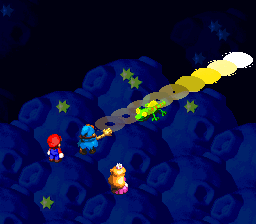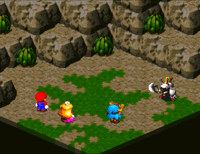Geno Whirl: Difference between revisions
Annalisa10 (talk | contribs) No edit summary Tag: Mobile edit |
(→Names in other languages: |ChiS=吉诺利刃 |ChiSR=Jínuò Lìrèn |ChiSM=Geno Blade) |
||
| Line 19: | Line 19: | ||
|JapR=Jīno Kattā | |JapR=Jīno Kattā | ||
|JapM=Geno Cutter | |JapM=Geno Cutter | ||
|ChiS=吉诺利刃 | |||
|ChiSR=Jínuò Lìrèn | |||
|ChiSM=Geno Blade | |||
}} | }} | ||
Revision as of 01:03, November 20, 2023
| Super Mario RPG: Legend of the Seven Stars move | |
|---|---|

| |
| Geno Whirl | |
| Used by | Geno |
| Type | Magic |
| Magic power | 45 |
| Effect | Damage |
| Element | Neutral |
| Target | One enemy |
| Damage reduced | N/A |
Geno Whirl is an attack Geno learns at Level 11 in Super Mario RPG: Legend of the Seven Stars. The attack involves Geno throwing a disk of light that follows a straight path to and through the enemy. Geno Whirl is notable for being one of the most powerful attacks in the game; if the player pushes right as the attack leaves the screen, 9999 damage is dealt to the enemy. This strategy however does not work on bosses (except for some of King Calamari's tentacles, Speardovich mirages, and Exor); the chest monsters (Huhwhat, Whuhoh, Pleaseno, and Comeon); clones created by Belome and Magikoopa; Machine Made copies of bosses, and Shy Rangers. The attack must be timed precisely; otherwise it will do an unimpressive amount of damage. Geno Whirl costs eight Flower Points to use and is one of the few magic attacks Geno can perform that does not instruct the player beforehand. Geno Whirl has the distinction of being the only special move in Mario's party that inflicts critical damage.
Names in other languages
| Language | Name | Meaning | Notes |
|---|---|---|---|
| Japanese | ジーノカッター[?] Jīno Kattā |
Geno Cutter | |
| Chinese (simplified) | 吉诺利刃[?] Jínuò Lìrèn |
Geno Blade | |
| French | Genolame[?] | Geno Blade |
Trivia
- In Nintendo Power issue 82, a caption explains, "The Geno Whirl Special Attack works particularly well against undead enemies."[1] This bonus is not present in the final version, however.
References
- ^ March 1996. Nintendo Power Magazine Volume 82, page 31. Retrieved November 30, 2011.
